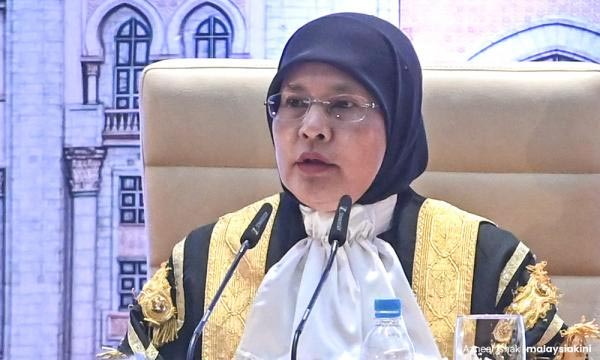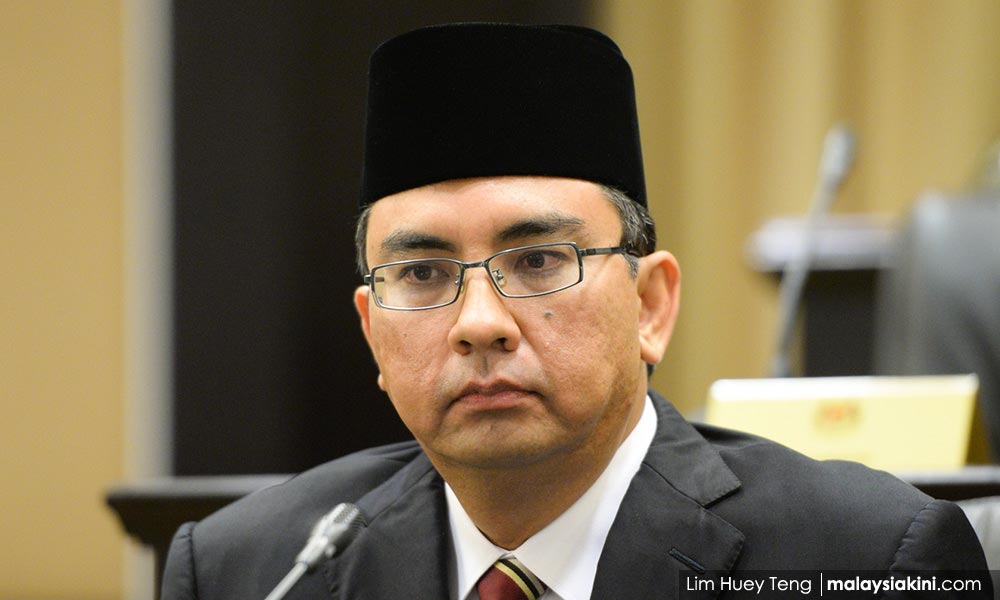By Hidir Reduan Abdul Rashid | Malaysiakini

The MACC investigation against the superior court judge who convicted and sentenced former Prime Minister Najib Abdul Razak was done without following protocol, the Federal Court ruled.
The seven-person bench, chaired by Chief Justice Tengku Maimun Tuan Mat, unanimously ruled that the anti-graft watchdog carried out the probe against Court of Appeal judge Mohd Nazlan Mohd Ghazali without consulting her beforehand.
In reading out the observation of the bench – also comprised of Court of Appeal President Abang Iskandar Abang Hashim, Chief Judge of Malaya Mohamad Zabidin Mohd Diah, as well as Federal Court judges P Nallini, Vernon Ong Lam Kiat, Harmindar Singh Dhaliwal, and Rhodzariah Bujang – Tengku Maimun (above) observed the “curious” timing of the publicising of the probe done before Najib’s SRC appeal before the apex court last year.
Today’s ruling is over a constitutional referral linked to a pending main legal challenge against the MACC probe over Nazlan.
In reading out the ruling today, Tengku Maimun said while the Federal Constitution empowers criminal investigation agencies such as MACC to investigate sitting judges as well as allow the Public Prosecutor to institute criminal court proceedings against such judges, those powers must be exercised in good faith and in genuine cases.
She said this is important to ensure the judiciary is able to carry out its functions freely and independently from external influence.
Tengku Maimun noted that the apex bench’s observation is borne out by the real and apparent concerns on the significance of separation of powers, the bane of democracy, and attacks on the independence of the judiciary.
She pointed out that in the event that the powers by the criminal investigation agencies or the Public Prosecutor were exercised for collateral purposes, then it amounts to abuse of such powers and judicial interference, and thus constitutes an actionable complaint through the filing of a legal challenge to quash criminal court cases.

“It appears to us that in considering the sacrosanct of judicial independence, the Federal Constitution implies a higher standard on investigative bodies when investigating judges are being investigated.
“If it can be demonstrated that the investigation was done for collateral purposes, that investigation can be set aside when judicially reviewed (in a legal challenge against such investigation),” Tengku Maimun said, making reference to the 2021 Federal Court ruling in N. Sundra Rajoo v. The Foreign Minister of Malaysia & Others.
“Criminal investigative bodies, whenever they investigate anyone, are bound to comply with the law. The onus on them to comply with the law is even more onerous when it concerns a serving superior court judge because not only are they bound by the said judge’s guarantees of fundamental rights under the Federal Constitution, due process of the law governing their powers and criminal procedure, but also the prohibition against judicial interference.
“Judicial independence is a sacrosanct concept. Judges and the entire judicial process must be free to perform their functions freely and independently to arrive at a just and fair decision. A judge who decides a case impacted by extraneous considerations ends up making a decision that is not in accordance with the law and the rule of law generally. This is all the more jarring if the case in question involves public interest, the very interest that the judiciary is sworn to uphold as the final beacon of justice.
“The fact remains that no matter which way one looks at it, criminal investigative bodies are executive bodies and thus investigations into judges can amount to judicial interference. This is the case whether the crime alleged is against or tied to a judicial act or an extra-judicial act,” Tengku Maimun said.
She pointed out that in demonstrating the bona fide (good faith) of a criminal investigation, the scheme of the Federal Constitution, having accepted the Chief Justice as the head of the Judiciary, requires that when investigating a criminal complaint, the relevant criminal investigative body must first consult the Chief Justice before commencing any investigations into the said judge.
Tengku Maimun said though this does not mean that the Chief Justice now has the power to sanction or stymie any investigations, rather, simply the right to be informed on what is transpiring with a judge and hence the judiciary as a whole.
“Once the Chief Justice is notified of a criminal complaint, the Chief Justice may then also decide to take any disciplinary action against the judge concerned (under Article 125 of the Federal Constitution).
“This also enables the Chief Justice the ability to advise the relevant authorities concerned whether similar complaints have been received by the judiciary in the past and this helps to verify whether the allegations are purely frivolous in nature or whether they carry some weight. Viewed in this way, the provisions on discipline and ethics (on the one hand) and the powers of criminal investigative bodies (on the other hand) exist on the same plane.
“The failure to consult the Chief Justice, even if the Chief Justice is the subject of a criminal complaint, is thus a very strong indication of a lack of bona fide in a criminal investigation.
“Other indicators of the lack of bona fide in an investigation would include the manner in which the investigation is done. As stated earlier, the very notion that a Judge is being investigated is deleterious to the image of the judiciary as a whole. Thus, the posting of statements or publicising such an investigation is wholly unnecessary unless of course the judiciary, represented by the Chief Justice, has cleared such publication in the interest of the judiciary itself,” she said.
Tengku Maimun said, on a cursory reading of the facts and upon examining the documentary evidence on record, it is blatant that any investigations commenced against Nazlan were done without regard to judicial independence as none of the above protocols appeared to have been followed.
She said there is no evidence, at least at this stage of the case, that she was ever consulted as there is no deposition from the MACC and government to this effect in their affidavits.
She noted that the manner in which the investigations were publicised by way of a press statement also does not appear to preserve or lend confidence to the independence of the judiciary.
“Though the MACC’s press statement (issued last year over the probe against Nazlan) does not refer to judge Nazlan by name, contemporaneous media reports which mention judge Nazlan and the earlier spurious blog post all do refer to him, which are sufficient to enable any reasonable citizen who reads the press statement to deduce or believe that judge Nazlan was suspected of having committed a crime. That fact in itself can tarnish the image of an independent judiciary.
“In addition, we take note that at the time the press statement was issued, there was significant buzz in the media that former Prime Minister Najib Abdul Razak’s final appeal in the SRC International case was soon coming up for hearing before the Federal Court.
“The former Prime Minister even relied on an argument of supposed bias on the part of judge Nazlan and his former employment with Maybank as a ground to nullify his conviction. The curious timing of the investigation against judge Nazlan which was done without consultation with the judiciary also casts doubt on whether the investigation against judge Nazlan was bona fide.
“In this regard, our observations on constitutional judicial review and statutory judicial review are pertinent. The fact that judge Nazlan was subject to questionable criminal investigation is very much the subject of statutory judicial review where purely administrative remedies may be sought to nullify those investigations,” she ruled.
Legal challenge
The three respondents in today’s constitutional referral are the MACC and its Chief Commissioner Azam Baki as well as the federal government.
Counsel Malik Imtiaz Sarwar appeared for the two constitutional referral applicants, namely lawyers Haris Ibrahim, Nur Ain Mustapha, and Sreekant Pillai.
Senior federal counsel Liew Horng Bin represented the MACC, Azam, and the federal government.
Lawyer New Sin Yew appeared for the Malaysian Bar as amicus curiae (Latin maxim meaning friend of the court, who assists the court in arriving at a decision over constitutional issues).
Haris and the other two lawyers are expected to rely on today’s apex court ruling to strengthen their originating summons targeting the MACC probe against Nazlan, which is pending before the Kuala Lumpur High Court.
Through the main legal challenge, the legal practitioners seek to declare that the MACC was not entitled to investigate judges unless they have been suspended or removed.
It also seeks a declaration that a Public Prosecutor is not empowered to institute or conduct any proceedings for an offence on serving judges of a court and that the investigation against Nazlan was unconstitutional.
Yesterday in Parliament, Minister in the Prime Minister’s Department (Law and Institutional Reform) Azalina Othman Said announced that the MACC has submitted its report on the probe against Nazlan to Tengku Maimun.
Leissner’s testimony
The MACC opened an investigation paper on Nazlan on April 23 last year, following a report lodged by Persatuan Sahabat Ulul Amri Malaysia based on allegations contained in former Goldman Sachs banker Tim Leissner’s testimony in a US court.

According to the group, Leissner’s testimony linked Nazlan to 1MDB’s deal involving Tanjung Energy Holdings Sdn Bhd in 2012.
At the material time, Nazlan was part of Maybank. He joined the judiciary in 2017 as a judicial commissioner.
Najib’s legal team has also tried to discredit Nazlan by claiming that he had a conflict of interest in the 1MDB case.
Nazlan, when he was a High Court judge in 2020, sentenced Najib to 12 years in prison and RM210 million for corruption, abuse of power, and money laundering.
The Court of Appeal upheld the decision last year. On Aug 23 last year, the Federal Court dismissed Najib’s appeal, leading to the former Finance Minister currently serving a custodial term at Kajang Prison.
However, the Federal Court is currently presiding over his application to review the Aug 23 verdict.



